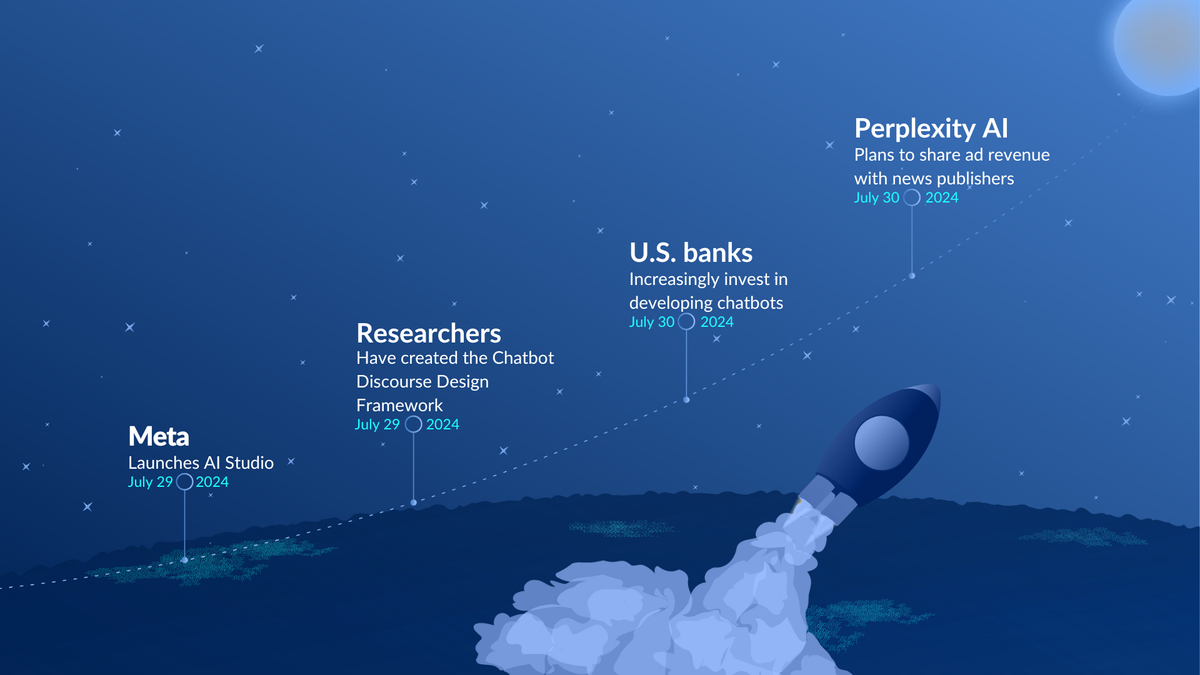Powered by Data - August 5, 2024
Keep up-to-date on conversational AI & chatbots with fascinating data points and weekly news.

- Meta has introduced AI Studio, a platform for creating, sharing, and discovering custom AI characters, starting in the US. AI Studio allows users to design AIs without needing technical skills, enabling them to provide entertainment, advice, and more. Users can create AI characters via ai.meta.com/ai-studio or Instagram, customizing their name, personality, tone, avatar, and tagline. AI Studio also supports creators by allowing them to set up AI extensions to handle common DM questions and story replies, enhancing fan engagement. Policies ensure safe and responsible AI interactions, marking the beginning of broader creative AI capabilities.
Read More - U.S. banks increasingly invest in developing chatbots as their primary customer engagement tools. According to Curinos’ Digital Banking Analyzer, successful response rates of chatbots have increased by 8.3 percentage points since 2022. The ability of chatbots to fully resolve queries has risen from 11.0% to 15.5%, and informative responses have surged from 0.7% to 8.6%. However, navigational responses have only slightly decreased, and the number of users diverted to live chat remains consistent. Banks aim for chatbots to handle more sophisticated tasks like transactions, alerts, and account management, moving beyond mere support functions.
Read More - Perplexity AI plans to share ad revenue with news publishers when its chatbot cites its content, aiming to address accusations of plagiarism and unethical web scraping. The initiative will start in a few months and involve partners like Automattic, Der Spiegel, and TIME, who will receive access to Perplexity’s APIs and Enterprise Pro offerings. Although exact revenue-sharing details are undisclosed, Perplexity’s head of business, Shevelenko, said it would be a “double-digit” percentage point. The program also allows publishers to build custom answer engines on their sites, enhancing interaction with their content. Despite some publishers’ legal actions and cease-and-desist letters, Perplexity invites them to join the revenue-sharing initiative.
Read More - Researchers at the School of Management have created the Chatbot Discourse Design Framework to enhance the conversational abilities of AI chatbots, making them more intuitive and human-like. This framework identifies key conversation patterns in human discussions and links them to chatbot designs to improve performance. Raj Sharman, a professor at the University at Buffalo and study co-author, emphasizes that the success of chatbots in various sectors, such as customer service and healthcare, depends on their ability to understand and respond meaningfully. The study, soon to be published in AIS Transactions on Human-Computer Interaction, categorizes chatbots into three types: informative, task-based, and conversational, each requiring unique conversational strategies.
Read More
